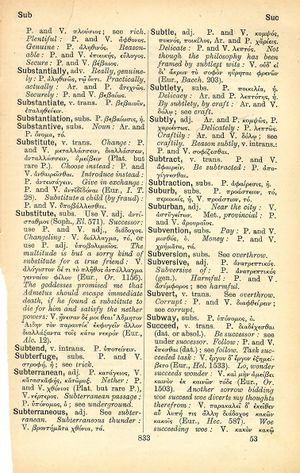succeed: Difference between revisions
οὐχὶ σοῦσθ'; οὐκ ἐς κόρακας; οὐκ ἄπιτε; παῖε τῷ ξύλῳ → You will not go? The plague seize you! Will you not clear off? Hit them with your stick!
(Woodhouse 5) |
(CSV5) |
||
| Line 1: | Line 1: | ||
{{ | {{Woodhouse1 | ||
| | |Text=[[File:woodhouse_833.jpg|thumb|link={{filepath:woodhouse_833.jpg}}]]'''v. trans.''' | ||
P. διαδέχεσθαι (dat. or absol.). | |||
<b class="b2">Be successor</b>: see under [[successor]]. | |||
<b class="b2">Follow</b>: P. and V. ἕπεσθαι (dat.); see [[follow]]. | |||
<b class="b2">Task succeeded task</b>: V. ἔργου δʼ [[ἔργον]] ἐξημείβετο (Eur., ''Hel.'' 1533). | |||
<b class="b2">Lo, wonder succeeds wonder</b>: V. καὶ μὴν ἀμείβει καινὸν ἐκ καινῶν τόδε (Eur., ''Or.'' 1503). | |||
<b class="b2">Another sorrow bidding woe succeed woe diverts my thoughts therefrom</b>: V. παρακαλεῖ δʼ [[ἐκεῖθεν]] αὖ λυπή τις ἄλλη [[διάδοχος]] κακῶν κακοῖς (Eur., <b class="b2">Hec.</b> 587). | |||
<b class="b2">Woe succeeding woe</b>: V. κακὸν κακῷ διάδοχον (Eur., ''And.'' 802). | |||
V. intrans. <b class="b2"></b>Be successful</b>, of persons or things: P. and V. ὀρθοῦσθαι, εὐτυχεῖν, κατορθοῦν (or pass.), [[εὖ]] φέρεσθαι; see [[answer]]. | |||
<b class="b2">Of persons only</b>: P. and V. τυγχάνειν, P. κατατυγχάνειν, ἐπιτυγχάνειν. | |||
<b class="b2">When he didn't succeed</b>: P. ὡς αὐτῷ οὐ προὐχώρει (Thuc. 1, 109). | |||
<b class="b2">Of things only</b>: P. and V. [[εὖ]] χωρεῖν, προχωρεῖν. | |||
<b class="b2">Succeed in</b>: P. and V. [[δύναμαι|δύνασθαι]] (infin.), ἔχειν (infin.); see <b class="b2">be able</b>, under [[able]]. | |||
<b class="b2">Come next</b>: Ar. and P. ἐπιγίγνεσθαι. | |||
<b class="b2">Succeeding</b>: P. and V. ἐπιών; see under [[succeeding]]. | |||
<b class="b2">Succeed to, inherit</b>: P. and V. παραλαμβάνειν (acc.). | |||
}} | }} | ||
Revision as of 10:06, 21 July 2017
English > Greek (Woodhouse)
v. trans.
P. διαδέχεσθαι (dat. or absol.).
Be successor: see under successor.
Follow: P. and V. ἕπεσθαι (dat.); see follow.
Task succeeded task: V. ἔργου δʼ ἔργον ἐξημείβετο (Eur., Hel. 1533).
Lo, wonder succeeds wonder: V. καὶ μὴν ἀμείβει καινὸν ἐκ καινῶν τόδε (Eur., Or. 1503).
Another sorrow bidding woe succeed woe diverts my thoughts therefrom: V. παρακαλεῖ δʼ ἐκεῖθεν αὖ λυπή τις ἄλλη διάδοχος κακῶν κακοῖς (Eur., Hec. 587).
Woe succeeding woe: V. κακὸν κακῷ διάδοχον (Eur., And. 802).
V. intrans. Be successful, of persons or things: P. and V. ὀρθοῦσθαι, εὐτυχεῖν, κατορθοῦν (or pass.), εὖ φέρεσθαι; see answer.
Of persons only: P. and V. τυγχάνειν, P. κατατυγχάνειν, ἐπιτυγχάνειν.
When he didn't succeed: P. ὡς αὐτῷ οὐ προὐχώρει (Thuc. 1, 109).
Of things only: P. and V. εὖ χωρεῖν, προχωρεῖν.
Succeed in: P. and V. δύνασθαι (infin.), ἔχειν (infin.); see be able, under able.
Come next: Ar. and P. ἐπιγίγνεσθαι.
Succeeding: P. and V. ἐπιών; see under succeeding.
Succeed to, inherit: P. and V. παραλαμβάνειν (acc.).

